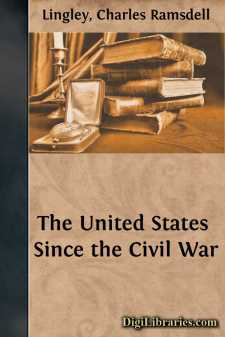Categories
- Antiques & Collectibles 13
- Architecture 36
- Art 48
- Bibles 22
- Biography & Autobiography 813
- Body, Mind & Spirit 142
- Business & Economics 28
- Children's Books 15
- Children's Fiction 12
- Computers 4
- Cooking 94
- Crafts & Hobbies 4
- Drama 346
- Education 46
- Family & Relationships 57
- Fiction 11828
- Games 19
- Gardening 17
- Health & Fitness 34
- History 1377
- House & Home 1
- Humor 147
- Juvenile Fiction 1873
- Juvenile Nonfiction 202
- Language Arts & Disciplines 88
- Law 16
- Literary Collections 686
- Literary Criticism 179
- Mathematics 13
- Medical 41
- Music 40
- Nature 179
- Non-Classifiable 1768
- Performing Arts 7
- Periodicals 1453
- Philosophy 64
- Photography 2
- Poetry 896
- Political Science 203
- Psychology 42
- Reference 154
- Religion 513
- Science 126
- Self-Help 84
- Social Science 81
- Sports & Recreation 34
- Study Aids 3
- Technology & Engineering 59
- Transportation 23
- Travel 463
- True Crime 29
The United States Since the Civil War
Description:
Excerpt
CHAPTER I
RECONSTRUCTION AND ITS AFTERMATH
Abraham Lincoln in the presidential chair was regarded by many of the politicians of his party as an "unutterable calamity"; and while the news of Lincoln's assassination was received with expressions of genuine grief, the accession of Vice-President Andrew Johnson was looked upon as a "Godsend to the country." As the Civil War came to a close, Lincoln opposed severe punishments for the leaders of the Confederacy; he urged respect for the rights of the southern people; he desired to recognize the existence of a Union element in the South, to restore the states to their usual relations with as little ill-feeling as possible, and in the restoration process to interfere but little with the normal powers of the states. Johnson, on the contrary, "breathed fire and hemp." "Treason," he asserted over and again, "should be made odious, and traitors must be punished and impoverished. Their great plantations must be seized, and divided into small farms and sold to honest, industrious men." For a time it seemed that the curtain would go down on the tragedy of Civil War only to rise immediately on the execution of the Confederate leaders and the confiscation of their property. A large and active group of Washington politicians believed in the necessity of a stern accounting with the "rebels." Lincoln's gentleness seemed to these bitter northerners like a calamity; Johnson's vindictiveness like a Godsend to the country. In the conflict between the policy of clemency and the policy of severity is to be found the beginning of the period of reconstruction.
Andrew Johnson was a compact, sturdy figure, his eyes black, his complexion swarthy. In politics he had always been a Democrat. So diverse were his characteristics that one is tempted to ascribe two personalities to him. He was a tenacious man, possessed of a rude intellectual force, a rough-and-ready stump speaker, intensely loyal, industrious, sincere, self-reliant. His courage was put to the test again and again, and nobody ever said that it failed. His loyalty held him in the Union in 1861, although he was a senator from Tennessee and his state as well as his southern colleagues were withdrawing. His public and private integrity withstood a hostile investigation that included the testimony of all strata of society, from cabinet officers to felons in prison. Later, at the most critical moment of his whole career, when he had hardly a friend on whom to lean, he was unflurried, dignified, undismayed.
Although Johnson was born in North Carolina, the greater part of his life was spent in eastern Tennessee. His education was of the slightest. His wife taught him to write, and while he plied his tailor's trade she read books to him that appealed to his eager intellect. When scarcely of voting age he became mayor of the town in which he lived and by sheer force of character made his way up into the state legislature, the federal House of Representatives and the Senate. President Lincoln made him military governor of Tennessee in 1862....


